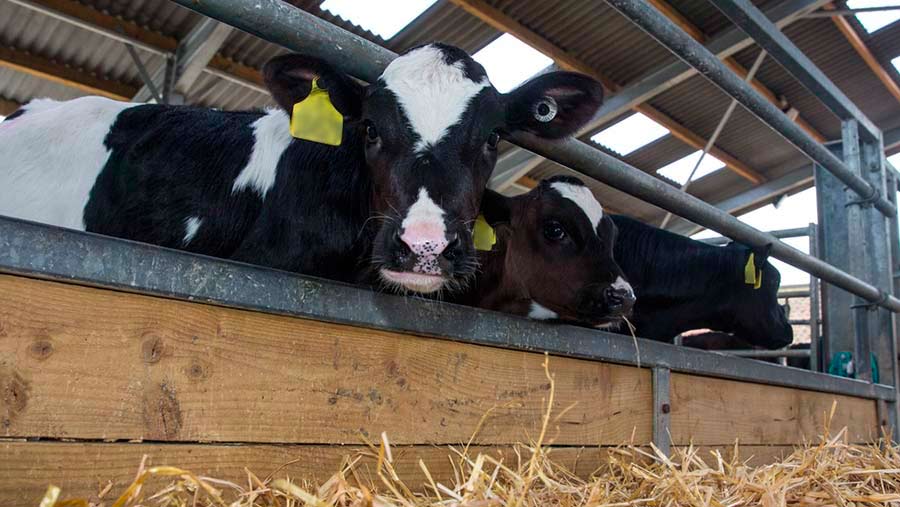How to prevent and treat cryptosporidiosis in calves
 © Tim Scrivener
© Tim Scrivener Cryptosporidiosis is the most common cause of diarrhoea in beef and dairy calves.
In severe outbreaks, scours caused by the bug can kill up to one-third of affected calves and SRUC estimates that cases cost £44 a head due to poorer performance.
AHDB Beef scientific officer Sarah Pick advises on how best to prevent and treat it.
What is cryptosporidiosis?
Cryptosporidiosis is one of the most common causes of calf scours in the UK. It is caused by a parasite called cryptosporidium and is usually seen in young calves less than six weeks old.
There are four species of the cryptosporidium parasite that infect cattle, however Cryptosporidium parvum (C parvum) is the most common species detected in calves less than six weeks old. This species of cryptosporidium can also infect humans.
See also: Vet Q&A: How to tackle calf scours
How do animals become infected?
Calves become infected with cryptosporidium when they ingest Cparvum oocytes (eggs). These oocytes reside in the environment in bedding, pasture, soil and drinking water.
They are very infectious, with only 10 oocytes required to cause disease in susceptible calves. Considering an infected calf can spread billions of eggs, it is easy to see why the disease spreads so quickly on farm.
What are the symptoms?
Symptoms include diarrhoea, dehydration, loss of appetite, fever and abdominal pain.
It is not only young calves with clinical signs of the disease, such as diarrhoea, that are shedding these oocytes into the environment. Infected calves at six to seven weeks of age may show no clinical signs of infection, even though they can still produce oocytes.
Adult cattle can also act as potential reservoirs for the C parvum parasite. They can also shed oocytes, but do not necessarily show any symptoms of the disease.
How can you treat cryptosporidiosis?
Currently there is no vaccine available and treatment options are limited. It is important that calves suffering from the disease are isolated and remain so for at least one week after the scouring has stopped. This should prevent the spread of eggs to other animals.
See also: Pasteurising milk and colostrum reduces calf scours
Rehydration of calves is key for survival, therefore feeding one to two litres of oral electrolytes two to four times a day is recommended. Halocur is the only product licensed in the UK for treatment of calves.
This drug does not cure the disease, but should help to reduce the clinical signs and egg shedding. It is important to note this drug cannot be used on dehydrated animals and can be toxic if overdosed.
Effective disinfectants for cryptosporidiosis
- 2-3% Keno Cox
- 2-4% Neopredisan
- 10% Ox-Virin
- 3% Hydrogen peroxide
Is there anything that can be done to prevent cryptosporidiosis?
Incidences of cryptosporidiosis can be reduced on farm through good hygiene and animal management.
It is important to ensure all dried faeces and other muck is removed from floors, walls and ceilings and that they are washed with an effective disinfectant (see right).
Other preventative measures include ensuring that cattle are regularly bedded down so that exposure to faeces is minimised, and that feed and water troughs are raised at least 0.75m off the ground to minimise contamination.
My herd is calving at the moment. How can I reduce the chance of an outbreak in my calves?
Newborn calves should receive at least three litres – or 10% of their bodyweight – of colostrum within two hours of birth. This will ensure the calf has a strong immune system to fight disease.
Avoid overcrowding and mixing of calves of different ages, particularly those that are a few weeks older that are likely to be shedding the disease.
Finally, if cryptosporidiosis is a regular occurrence on your farm each year, Halocur can be administered for the first seven days of life as a preventative treatment.
